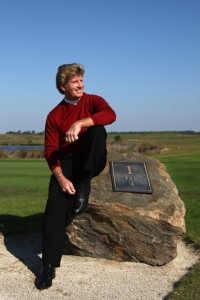By Richard Lord
When sports psychologist Dr. Robert K. Winters — or Dr. Bob for short — talks about “The Psychology of Excellence,” as he did at ING’s Spring Conference, you can’t help but listen.
After all, who else can make his points by using quotes from the 1989 cult comedy classic “Bill and Ted’s Excellent Adventure,” Greek philosopher Aristotle and the religious figure Buddha in one seminar?
In both his enthusiastic speaking style and with his message, Winters oozes confidence and preaches the need to believe in one’s self in order to be excellent, whether that is in the business world or on the golf course.
Dr. Bob’s countless success stories with golfers and other athletes make it obvious that those who listen to him benefit from his insight.
Winters, currently the resident psychologist at David Leadbetter’s World Headquarters in Orlando, Fla., said that from an early age he set a high goal for himself.
“I wanted to be great,” he said. “Everyone has to start out thinking they can win. It has to be a mind-set.”
And achieving the mind-set that leads to achieving excellence is not something that happens overnight. Which brings us to Winter’s quote from Aristotle, who lived between 384 and 322 BC.
“Excellence isn’t an act, but a habit,” Aristotle said.
Or as Winters puts it all these centuries later, “excellence is doing something over and over and over and getting it right.”
In an effort to gauge his golf students’ desires to achieve excellence, Dr. Bob asks several questions.
The first one is “are you good?
“All my best say they are definitely good while about half add a ‘but.’ There’s always this contingency that creates conditional confidence,’ Winters said. “On one side of the scale there is trust and on the other side there is fear, doubts and worry.”
So, Dr. Bob’s goal is to eliminate the doubt and trepidation, but as those of us to play the game know, that is easier said than done.
“I have talked to great athletes from other sports like Michael Jordan and there is no doubt that golf can be the most brutally emotionally devastating sport there is.”
The other questions Dr. Bob asks to figure out whether or not a student is willing to do the work it takes are: How do you know you are good? How good do you really want to be? How good would you be if you didn’t know how good you had to be? What are you willing to do to be as good as you can possibly be?
After those questions are answered, it’s time for Dr. Bob to instill his “five golden keys’ to attaining excellence.
No. 1: Believe in yourself.
“You are what you think you are,” Dr. Bob explains. “Your perception is your reality.”
No. 2: You need to build a life philosophy.
“Know if it is to be, it starts and ends with me,’ is the way Winters put it.
No. 3: You need to know and understand that optimism and perseverance are not natural or inherent qualities to the human condition.
Thus, it takes hard work to acquire those traits.
No. 4: You must disregard the good intentions of others and trust your instincts.
“You must become an expert on yourself,’ Dr. Bob said. “Don’t listen to the naysayers.”
No. 5: Don’t be afraid of making mistakes.
“Take a missed putt for what it is,” he said. “Failure is the fertilizer for future success.”
By doing the work that it takes to achieve personal excellence, you will able to live up to a line Winters quoted from “Bill and Ted’s Excellent Adventure.”
“Be excellent to yourself. Be excellent to others.”
Party on, golfers.

